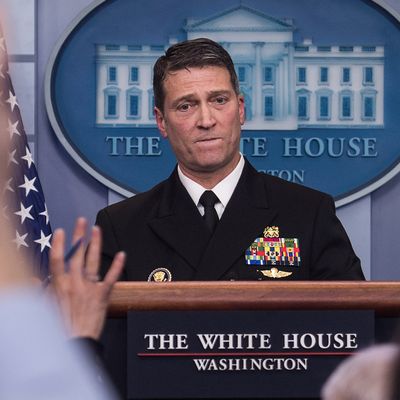
Even before he was accused of chronic alcoholism, handing out opioids like they were candy, verbally abusing his subordinates, and crashing a government vehicle while driving under the influence, Ronny Jackson’s nomination for secretary of Veterans Affairs was in peril. The White House doctor had no relevant experience for managing a large federal bureaucracy. And while this was true of several other members of the Trump Cabinet, congressional Republicans’ tolerance for neophytes and surprise announcements was wearing thin.
Thus, after more than 20 military veterans made misconduct allegations against Jackson, it quickly became clear that his nomination was not going to survive the Senate. This week, Republican senator Jeff Flake said Jackson’s nomination was “very unlikely” to go forward, noting that “all of us had questions before any of these recent allegations just on experience and qualifications.”
And yet, President Trump stood by his man. After Trump gave White House staff “the full green light to push back hard,” they released documents in which President Obama praised Jackson, and spread word that the physician had passed at least four background-check investigations since he started at the White House in 2006.
But on Wednesday Jackson was hit with even more serious allegations. And by Thursday morning, he’d surrendered.
In a statement, Jackson insisted that the allegations were “completely false and fabricated.”
“Unfortunately, because of how Washington works, these false allegations have become a distraction for this President and the important issue we must be addressing — how we give the best care to our nation’s heroes,” Jackson said. “While I will forever be grateful for the trust and confidence President Trump has placed in me by giving me this opportunity, I am regretfully withdrawing my nomination to be Secretary for the Department of Veterans Affairs.”
Less than 24 hours earlier, Senate Democrats on the Veterans Affairs Committee, which postponed a confirmation hearing for Jackson that was set to start this week, released a two-page summary of the claims they’d received from 23 of the nominee’s colleagues and former colleagues, most of whom are still in the military, broken down into three categories.
The first was Jackson’s alleged pattern of handing out prescription drugs without knowing a patient’s history, which earned him the nickname “Candyman.” Aside from freely dispensing Ambien on Air Force One (which may not be seen as a big deal in D.C.), they said he wrote prescriptions for himself, had staff write prescriptions for each other to cover for giving drugs to unauthorized patients, and in one instance sent the White House Medical Unit into a panic over missing Percocet. They said it turned out he’d given a large supply of the opioid to a White House Military Office staffer.
The second involved allegations that Jackson created a hostile work environment, charming his superiors while abusing those below him. The document included this epic roundup of co-workers’ complaints about Jackson:
Jackson was described as “the most unethical person I have ever worked with,” “flat-out unethical,” “explosive,” “100 percent bad temper,” “toxic,” “abusive,” “volatile,” “incapable of not losing his temper,” “the worst officer I have ever served with,” “despicable,” “dishonest,” as having “screaming tantrums” and “screaming fits,” as someone who would “lose his mind over small things,” “vindictive,” “belittling,” “the worse [sic] leader I’ve ever worked for.”
Finally, the report said Jackson had been accused of “multiple incidents of drunkenness on duty,” closing with an explosive claim: “At a Secret Service going-away party, Jackson got drunk and wrecked a government vehicle.”
Trump had nominated Jackson to replace one of his administration’s only Obama-era holdovers, David Shulkin, who was pushed out of his post after an inspector general’s report found that he had gone sightseeing — and improperly accepted Wimbledon tickets — during a trip overseas. But Shulkin maintains that he was fired for being insufficiently enthusiastic about privatizing the VA health system.





























